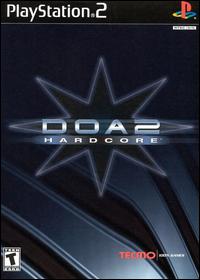In Collection
#98
Completed:
Yes
#98
Completed:
Yes
| Publisher | Tecmo, Inc. |
| Developer | Team Ninja |
| Series | Dead or Alive |
Tecmo, best known for its popular Ninja Gaiden series on the NES, wasn't the most likely source for a 3D fighter that would compete with the likes of the Tekken and Virtua Fighter series. And yet, thanks to their in-house development group, Team Ninja, that's exactly what the gaming public got in 1996, when Tecmo released Dead or Alive, a game built on Virtua Fighter's impressive engine. The game showed promise, although it was perhaps most famous for the buoyancy of its abundantly bosomed female characters. In an attempt to really compete with the big boys, Tecmo unleashed Dead or Alive 2 into arcades in 1999. The inevitable console versions soon followed, with Dreamcast's port being the quickest, as DOA2 was created using Sega's NAOMI hardware. For the PS2, Tecmo has beefed up the game to supposed "Hardcore" levels, adding a few flourishes to entice old and new fans alike. There are 12 playable characters to start, representing the wide mixed-martial arts style of all respectable 3D fighters, from Muay Thai kickboxing to Wu Shu to Pro Wrestling. There are four buttons, but their function is unique in the fighting world. Perhaps its closest cousin is the Virtua Fighter series, but DOA 2 has done much to establish itself as its own beast. There are only two striking buttons, one for punching and another for kicking, and a grapple button. There is no guard button, as DOA2 uses the Street Fighter 2/Tekken method of holding back to block. The important addition is the FREE button, which allows players to move in full 3D, ala Soul Calibur, as well as reverse almost any striking attack in the game. And these reversals are one of the major keys to DOA2. They are simple to perform and can turn around high and low attacks with ease. Learning this ability is at least as important as mastering the other moves of the characters, of which there are plenty. The game boasts a large martial arts arsenal: graceful strikes, canned combos, and multi-throws are all present, and most all of these can be reversed, once the basics of the engine is grasped by the player. The fighting arenas in DOA2 are generally some of the largest available in a 3D fighter. Many of them are multi-tiered, giving players the ability to bash their opponent over ledges of a building or through the stained-glass windows of a cathedral. A few levels even possess so-called Danger Zones that can be triggered by knocking opponents into them, causing extra damage to occur. There are also differences in terrain and topographical grade that change the mechanics of movement slightly. DOA2: Hardcore's modes include Time Attack, Versus, Survival, Team and Sparring (practice). DOA2 also has a Watch Mode, where players can view computer-controlled demonstrations, and Battle Rec. Mode, where players can record their battles. The modes that Tecmo obviously attempted to innovate are the Story Mode, which attempts to bring a flowing plot to the normal string of battles, and Tag Mode, DOA2's very own two-on-two mode in the tradition of Capcom's Vs. series and Namco's Tekken Tag Tournament. In an attempt to lure people who might have already had their fill on the Dreamcast version, released months earlier, Tecmo has added a slew of new goodies. In addition to new moves for every character, there are new one-on-one and tag levels, double the number of costumes (over 70), an English dub, and a CGI Gallery where people who would like to view the DOA2 ladies in various states of disrobement can do just that. Tecmo also claims to have improved graphics and sound over the initial PS2 release, and there are now two more playable characters. Many of these features can be unlocked through various in-game feats. DOA2: Hardcore marks the fifth different version of the game released (Arcade, Japanese Dreamcast, English Dreamcast, Japanese PS2, and Hardcore all have different features) and Tecmo has endeavored to make this version the most complete, just as Team Ninja has done its best to see that Dead or Alive 2 is taken seriously as a member of the modern 3D fighting elite.
|
|
||||||||||||||||||||||||
